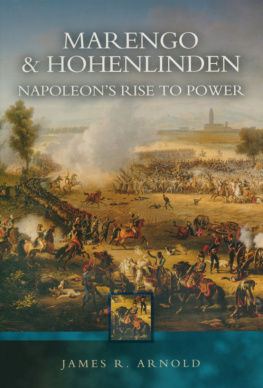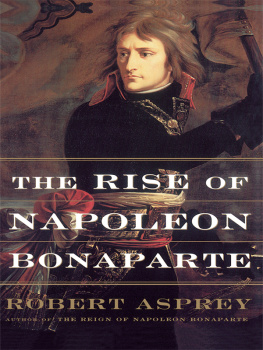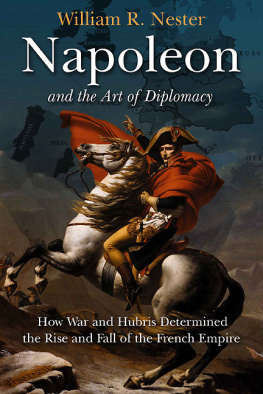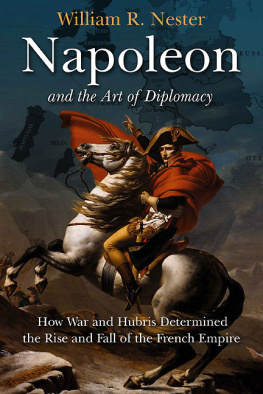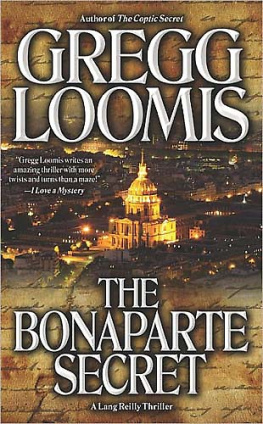MARENGO
and
HOHENLINDEN:
Napoleons Rise to Power
MARENGO
and
HOHENLINDEN:
Napoleons Rise to Power
James R. Arnold
To my parents,
Joyce B. and Robert C. Arnold
First published in the United States in 1999 by James R. Arnold.
Published in Great Britain in this format, in 2005 by Pen & Sword Military
An imprint of
Pen & Sword Books Ltd
47 Church Street
Barnsley
South Yorkshire
S70 2AS
Copyright James R. Arnold, 1999, 2005
ISBN 1 84415 279 0
The right of James R. Arnold to be identified as Author of this work has
been asserted by him in accordance with the Copyright, Designs and
Patents Act 1988.
A CIP catalogue record for this book is
available from the British Library
All rights reserved. No part of this book may be reproduced or
transmitted in any form or by any means, electronic or mechanical
including photocopying, recording or by any information storage and
retrieval system, without permission from the Publisher in writing.
Designed by Graham Beehag Book Design
Maps by Max Sewell and Jerry Malone
Printed and bound in UK
By CPI UK
Pen & Sword Books Ltd incorporates the Imprints of Pen & Sword
Aviation, Pen & Sword Maritime, Pen & Sword Military, Wharncliffe Local
history, Pen & Sword Select, Pen & Sword Military Classics and Leo
Cooper.
For a complete list of Pen & Sword titles please contact
PEN & SWORD BOOKS LIMITED
47 Church Street, Barnsley, South Yorkshire, S70 2AS, England
E-mail: enquiries@pen-and-sword.co.uk
Website: www.pen-and-sword.co.uk
(in the order they appear)
European Theater: 1800
To honor the leaders and to distinguish officers in the service of France or Austria, leaders are usually referred to with their French or Austrian rank. The following provides the hierarchy of rank and for the Austrians, the abbreviations used in the text, and the United States Army equivalent.
| French | U.S. |
| general of brigade | brigadier general, usually commanding a demi-brigade |
| general of division | major general, usually commanding a division |
| lieutenant general | lieutenant general commanding either a corps or army |
| Austrian | U.S. |
| Oberst | colonel |
| Inhaber | regimental proprietor, usually an honorific position |
| General-Feldwachmeister (GM) | major general |
| Feldmarschall-Leutnant (FML) | lieutenant general |
| General der Kavallerie (GdK) | full general, cavalry |
| Feldzeugmeister (FZM) | full general, infantry |
| Erzherzog | archduke |
| Kaiser | emperor |
I am deeply grateful to Robert and Joyce Arnold, who underwrote the first edition; Graham Beehag, for his outstanding design work; David Chandler, who kindly loaned me his photo of Fort Bard; Patrick Crusiau, who located maps and source material in Brussels; Paddy Griffith, who shared his insights on the wars of the Revolution (and the perils of self-publication!); Philip Haythornthwaite, for responding to obscure queries and providing research material; Grace McCrowell, who cheerfully processed inter-library loan requests; George Nafziger, who provided research assistance and encouragement; Robert Paulley, whose Portell Production provided essential publishing contacts; Ralph Reinertsen, who labored on my behalf through the Mras manuscript and altered his vacation plans in order to explore with critical eye the battlefield of Hohenlinden; John Slonaker for providing access to the wonderful collection at the U.S. Army Military History Institute; Bernhard Voykowitsch, who shared material from the Vienna Kriegsarchiv and cheerfully responded to queries about the background of various obscure Austrian general officers; Roberta Wiener, my indispensable chief of staff who accompanied me on a tour of Marengo and had the patience to edit and proof read this book; and the administrators and librarians at the University of Virginia, Washington and Lee University, and the Virginia Military Institute, who open their collections to the public.
The Napoleon Series is a valuable and interesting Internet site where participants converse about a wide array of Napoleonic topics. There I posted queries about the first names and backgrounds of various military leaders and received helpful responses from kind contributors including Ian Jackson, Bruno Nackaerts, and Digby Smith. Thank you gentlemen.
Via the Napoleon Series I also met two skilled cartographers, Jerry Malone and Max Sewell. These gentlemen undertook the enormous labor of translating my sketches into the fine maps contained in this book. They worked long and hard, motivated solely by a love for the periods history. Their combination of graphic talents and knowledge about the period proved invaluable. So a special thanks to Jerry and Max: well done!
Lastly, a word about the illustrations. All are from the authors collection except for GdK Melas, courtesy of Bernhard Voykowitsch and the Vienna War Archives; Fort Bard, courtesy of David Chandler; and the Hohenlinden terrain photos, courtesy of Ralph Reinertsen.
Prologue:
Afternoon on the Field of Marengo
T he afternoon sun seemed to linger. Its position told Napoleon Bonaparte that there was no chance that darkness would come to save his army. Seventeen thousand Frenchmen were retreating before an ascendant Austrian army. Unless something dramatic occurred, this battle was lost.
The young leaders position as First Consul rested precariously upon a coalition of diverse interests. Win this battle and his support would solidify. Lose, and his many enemies in Paris might surface to rally around some other popular general whom they would anoint as titular leader of state. Protected by that generals sword perhaps Bernadottes, more likely Moreaus they would methodically purge his supporters and eventually annihilate the Bonaparte clan.
That matters had reduced to such a state was his own fault. His overconfidence had blinded him to the possibility that the Austrians might attack. When they had stormed out of their bridgehead this morning, his army had been badly dispersed, its front line units surprised. Yet his lieutenants old comrade Victor, gallant Lannes had conducted a brilliant tactical battle until overwhelmed by numbers. Thirty minutes earlier Bonaparte had committed his own elite Consular Guard to help cover their retreat. The Guard performed prodigies, until it too fell back before superior numbers.

